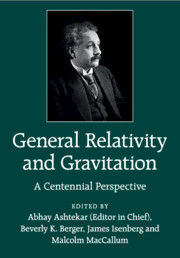Preface
Published online by Cambridge University Press: 05 June 2015
Summary
The discovery of general relativity by Albert Einstein 100 years ago was quickly recognized as a supreme triumph of the human intellect. To paraphrase Hermann Weyl, wider expanses and greater depths were suddenly exposed to the searching eye of knowledge, regions of which there was not even an inkling. For 8 years, Einstein had been consumed by the tension between Newtonian gravity and the spacetime structure of special relativity. At first no one had any appreciation for his passion. Indeed, “as an older friend,” Max Planck advised him against this pursuit, “for, in the first place you will not succeed, and even if you succeed, no one will believe you.” Fortunately Einstein persisted and discovered a theory that represents an unprecedented combination of mathematical elegance, conceptual depth and observational success. For over 25 centuries, spacetime had been a stage on which the dynamics of matter unfolded. Suddenly the stage joined the troupe of actors. As decades passed, new aspects of this revolutionary paradigm continued to emerge. It was found that the entire universe is undergoing an expansion. Spacetime regions can get so warped that even light can be trapped in them. Ripples of spacetime curvature can carry detailed imprints of cosmic explosions in the distant reaches of the universe. A century has now passed since Einstein's discovery and yet every researcher who studies general relativity in a serious manner continues to be enchanted by its magic.
This volume was commissioned by the International Society on General Relativity and Gravitation to celebrate a century of successive triumphs of general relativity as it expanded its scientific reach. Through its 12 Chapters, divided into four Parts, the volume takes us through this voyage, highlighting the advances that have occurred during the last three decades or so, roughly since the publication of the 1979 volumes celebrating the cen- tennial of Einstein's birth.
- Type
- Chapter
- Information
- General Relativity and GravitationA Centennial Perspective, pp. xiii - xivPublisher: Cambridge University PressPrint publication year: 2015



